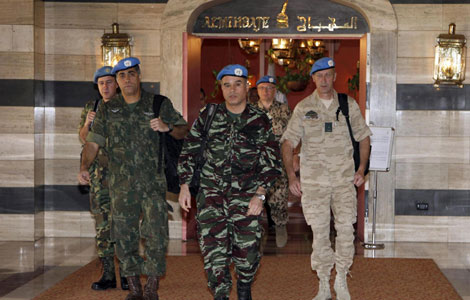 |
|
|
|
|||||||||||
Thai Prime Minister Yingluck Shinawatra will start a three-day official visit to China on Tuesday at the invitation of Chinese Premier Wen Jiabao. Following is her written interview with China Daily prior to the visit.
1. What do you think of the current level of China-Thailand ties? Is there any area that both sides can work together to improve?
Thai-Chinese relations remain close and cordial and are moving forward rapidly and smoothly in all key areas, including trade, investment, tourism, science and technology, health, education and culture. Trade and investment, in particular, are the two areas that have seen the most rapid expansion. China is our 2nd largest trading partner, while Thailand is China’s 14th largest. This makes China an important market for Thailand. At the same time, China is also an important investment source for Thailand. Chinese investors regard Thailand as an attractive investment destination in many fields, including infrastructure, agricultural and alternative energy.
Recently, during the official visit to Thailand of H.E. Mr. Xi Jinping, Vice President of the People’s Republic of China in December 2011, we signed the Memorandum of Understanding on Cooperation on Sustainable Development in Thailand, which demonstrates the determination of our two Governments to implement concrete cooperation in 4 areas, namely, high-speed railways, water management systems, alternative energy, and education and human resources development. These will be the key areas of cooperation on which our two Governments will be working closely together in the years to come.
For the next period of Sino-Thai relations, our two Governments have agreed to enhance, broaden and deepen our cooperation to be a comprehensive strategic cooperative partnership in order to generate greater concrete benefits for our two countries and peoples, as well as peace, stability and socio-economic prosperity in the region and beyond.
I am confident that my official visit to China will further strengthen our existing cordial friendship and bring about more fruitful and concrete cooperation between our two countries and peoples.
2. We all know that Chinese police in mid-December started joint patrols with their counterparts from Laos, Myanmar and Thailand to maintain security along the Mekong River. How do you comment on the joint patrol?
The Thai side is ready to participate in the cooperation on patrol in the Mekong River under the 4 party mechanism framework which was agreed upon between China, Myanmar, Laos and Thailand in October 2011.
As the Mekong River is an important waterway for transport of goods, tourism and people-to-people contacts for all 4 nations, Thailand supports the aim of the 4 party mechanism which will increase safety and security of riverine traffic in the region.
Thailand believes that the cooperation on patrol in the Mekong River by itself cannot bring about sustainable safety and security for riverine traffic. All 4 participating nations must further cooperate to address the root causes of the issue by ensuring the continuous enforcement of relevant laws in other areas, particularly on combating transnational crime on the Mekong River such as the trafficking of narcotic drugs, weapons and humans, and illegal immigration. Areas adjacent to the banks of the Mekong River should be jointly developed by all sides in order to improve living standards of the people in the area.
3. How do you comment on China's peaceful development and China's ties with ASEAN countries? Is there any area you think that China should improve to boost the ties with these countries?
For the past 20 years, ASEAN and China have been partners in development. China shares with ASEAN the same goal of peaceful development, which has enabled the region to focus on economic and social development, benefits from economic growth while becoming resilient to the on-going global financial crisis. Indeed China is an engine of growth that can help spur the development of the entire region. This was most clearly seen in China’s vital role in helping Asia recover from the global financial crisis in 2009.
On areas to deepen our ties, China is already ahead of the game in identifying areas of cooperation with ASEAN. At the 14th ASEAN-China Summit in Bali in November 2011, Premier Wen made a number of key proposals such as the establishment of the ASEAN-China Connectivity Cooperation Committee, the 3 billion Yuan ASEAN-China Maritime Cooperation Fund and the communication channel between the ASEAN Disaster Management Humanitarian Assistance Coordinating Centre and China’s relevant authorities, all of which were warmly welcomed by ASEAN. He also proposed to designate 2012 as the year of ASEAN-China science and technology cooperation.
China has proven to be a responsible and constructive partner of ASEAN, and I hope that China will continue to play a constructive role and contribute to maintaining peace, stability and socio-economic development in the region.
4. What role do you think China plays in the development of Thailand and other ASEAN countries? Do you think Thailand will contribute as a coordinator to promote China-ASEAN ties?
Apart from the expansion of our trade and investment, the Governments of our two countries are now working closely to implement the Memorandum of Understanding on Cooperation on Sustainable Development in Thailand. Cooperation under this MOU is a good example of how China’s expertise and technology could assist Thailand to advance its development for the betterment of the Thai people.
In the regional context, China is the most active dialogue partner of ASEAN and has played a key role in the development of ASEAN, including ASEAN Community building efforts. Thailand appreciates China’s role and efforts in bridging the transportation gap and fostering economic cooperation in the region, particularly under the Greater Mekong Subregion (GMS) framework, which will support the full realization of connectivity in ASEAN and provide greater business opportunities in terms of trade, investment, tourism and people –to- people interactions, especially along the economic corridors in the region. This benefits Thailand’s economic development as well.
ASEAN and China have also agreed to cooperate on eleven priority areas of cooperation, namely agriculture, information and communication technology, human resource development, Mekong Basin Development, investment, energy, transport, culture, public health, tourism and environment.
As an incoming country coordinator of ASEAN-China relations, Thailand is committed to continue the good progress and momentum achieved between ASEAN and China thus far and will put particular emphasis on 3Cs comprising of community, connectivity, and code of conduct through close coordination and regular consultation.
5. Female politicians are getting more power these years. As the first female Thai Prime Minister, what kind of advantages do you think you have compared to your male colleagues?
While some believe that femininity makes women weak, I believe that a woman’s gentleness, empathy and sensitivity are important advantages. Furthermore, we have a lot of problems to solve, particularly on the issue of reconciliation. My strength as a woman is that I am better able to achieve compromise, and I am more patient than some of the men.

|

|

|

|

|

|